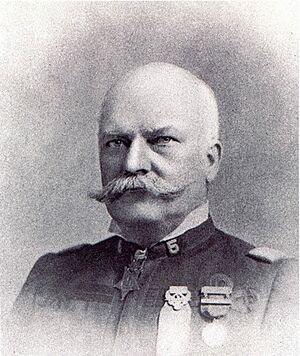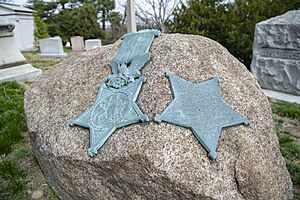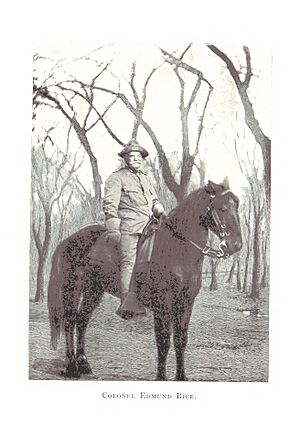Edmund Rice (Medal of Honor) facts for kids
Quick facts for kids
Edmund Rice
|
|
|---|---|
 |
|
| Born | December 2, 1842 Brighton, Massachusetts, US |
| Died | July 20, 1906 (aged 63) Wakefield, Massachusetts, US |
| Place of burial | |
| Allegiance | United States of America Union |
| Service/ |
United States Army Union Army |
| Years of service | 1861–1903 |
| Rank | |
| Unit | |
| Battles/wars | American Civil War, Indian Wars, Spanish–American War, Philippine–American War |
| Awards | Medal of Honor |
Edmund Rice (December 2, 1842 – July 20, 1906) was a brave and decorated soldier in the United States Army. He served in four major wars and earned the Medal of Honor, the highest award for bravery in the U.S. military. He eventually became a Brigadier General.
Contents
A Young Adventurer
Edmund Rice was born in Brighton, Massachusetts, on December 2, 1842. As a teenager, he studied at Norwich University in Vermont. But he was also looking for adventure!
In 1858, at just 16 years old, he became an apprentice on a clipper ship called the Snow Squall. He sailed all the way from Boston to Shanghai, China, a journey that took ten months. After returning to America, he worked as a surveyor for his father.
Hero of the Civil War
When the American Civil War began in 1861, Edmund Rice joined the Union Army. He started as a captain in the 19th Massachusetts Infantry Regiment. He and his soldiers fought in many famous battles, including the Antietam and the Battle of Fredericksburg.
Bravery at Gettysburg
Rice's most famous moment came during the Battle of Gettysburg in July 1863. During a fierce Confederate attack known as Pickett's Charge, Rice showed incredible courage. He helped lead his men to push back the attack, a key moment that helped the Union win the battle. For his bravery, he was later awarded the Medal of Honor.
A Daring Escape
In May 1864, during the Battle of Spotsylvania Court House, Rice was wounded and captured by Confederate soldiers. While being taken away on a train, he made a daring escape. He cut a hole in the door of the moving freight car and jumped out! He traveled for 23 days to reach the safety of Union lines. After he recovered, he returned to lead his regiment again. By the end of the war, he had been promoted to colonel.
Life After the War
After the Civil War, Rice decided to make the army his career. He served in different parts of the country, including the South during the period known as Reconstruction.
During this time, he married Annie Clark Dutch in 1866. Sadly, Annie passed away just a few years later. They had one daughter named Corrine.
Conflicts on the Frontier
In the 1870s and 1880s, Rice was stationed in the American West. He took part in several campaigns during the Indian Wars, which were conflicts between the U.S. government and Native American tribes. In 1876, he joined a campaign in Montana, where the famous scout Buffalo Bill Cody helped guide the soldiers. He also commanded an expedition against the Ute tribe in Colorado.
Service Around the World
Rice's career took him far beyond the United States. From 1897 to 1898, he served as a U.S. military representative in Tokyo, Japan.
When the Spanish–American War started in 1898, he asked to return to active duty. He commanded the 6th Massachusetts Regiment in both Puerto Rico and Cuba.
After that war, he was sent to the Philippines during the Philippine–American War. He commanded the 26th Infantry Regiment. He was later appointed the Military Governor of the island of Panay. As governor, he helped set up public schools and worked to establish a peaceful government.
A Soldier and an Inventor
Edmund Rice was not just a soldier; he was also a clever inventor. He created several pieces of military equipment that were used by armies for many years. His inventions were designed to help soldiers in the field.
Some of his inventions include:
- A trowel bayonet, which was a knife that could also be used as a small shovel for digging trenches.
- A special stacking swivel that helped soldiers stack their rifles together securely.
- An individual shelter tent to protect soldiers from the weather.
Retirement and Legacy

After a long and impressive career, Rice returned to the U.S. in 1901. The difficult climate in the Philippines had affected his health. He retired from the army in 1903 with the rank of brigadier general.
In his retirement, he was a member of many military groups, including the Medal of Honor Legion. He passed away on July 20, 1906. He was buried with full military honors in Arlington National Cemetery.
His grave is marked by a large boulder with a bronze sculpture of the Medal of Honor. The inscription honors his "conspicuous bravery" at the Battle of Gettysburg.
Military Awards
Besides the Medal of Honor, General Rice earned medals for his service in four major conflicts:
- Civil War Campaign Medal
- Indian Campaign Medal
- Spanish Campaign Medal
- Philippine Campaign Medal
See also
 | Georgia Louise Harris Brown |
 | Julian Abele |
 | Norma Merrick Sklarek |
 | William Sidney Pittman |



